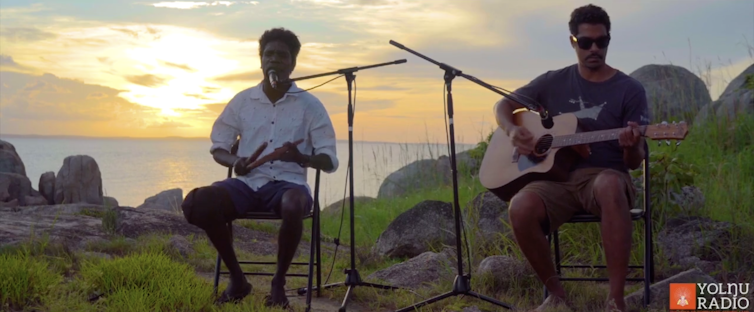East Arnhem Land artists respond to COVID-19 with the gift of music
- Written by Aaron Corn, Professor, Elder Conservatorium of Music · Director, Centre for Aboriginal Studies in Music (CASM) · Director, National Centre for Aboriginal Language and Music Studies (NCALMS), Faculty of Arts, University of Adelaide
Recent weeks have been a blur of livestreams as politicians and chief medical officers have taken to Facebook and YouTube to announce Australia’s emergency measures to contain the COVID-19 pandemic.
But on Saturday evening, I eagerly logged onto Facebook, along with more than 50,000 others, to enjoy a livestream of an entirely different kind. It was the first in a series of four East Arnhem Live music concerts to be streamed weekly.
It not only offers a welcome respite from the social isolation many Australians are now feeling, but it is also an ingenious way for Arnhem Land’s prolific musicians to share their music with audiences around the world.
On location
The Northern Territory’s Arnhem Land is home to dozens of remote Indigenous communities, including the Yolŋu communities in the far northeast. While there are presently no known cases of COVID-19 in Arnhem Land, the region’s economic stability relies heavily on artists’ income, which is greatly supported by local tourism during the dry season and international touring to festivals all year round.
Streamed on Saturday, April 24 and still available online, the first East Arnhem Live concert featured singer Yirrŋa Yunupiŋu, the current frontman of rock band Yothu Yindi, with Arian Pearson on acoustic guitar. To showcase Arnhem Land’s natural beauty, the concert was filmed on location at Gälaru (East Woody Beach) against the sun setting over the Arafura Sea, and incorporated stunning aerial cinematography of Dhamitjinya (East Woody Island).
 East Arnhem Live with Yirrŋa Yunupiŋu and Arian Pearson.
Facebook
East Arnhem Live with Yirrŋa Yunupiŋu and Arian Pearson.
Facebook
At a length of four songs over 14 minutes, it was a tantalisingly brief event that left me wanting more. It stirred deep nostalgia for my own experiences in Arnhem Land over the past 25 years and long collaborations with local musicians there.
Yirrŋa Yunupiŋu’s four-song set exemplified the very best of Yolŋu songwriting, building significantly on the heavy traditional influences of the style developed by Yothu Yindi around 1990. The influence of Manikay, the ancestral song tradition performed by Yolŋu communities in their public ceremonies, is ever-present in Yirrŋa’s own songs. This is evidenced by the bilma (paired sticks) he played throughout the concert.
With no more than a few hundred senior Yolŋu Manikay singers alive today, the present threat of COVID-19 brings into sharp relief the rarity and uniqueness of Manikay as a quintessentially Australian musical tradition. This is indeed a national treasure of global significance that deserves to be better supported and cherished in Australia and globally.
An anthem for our time
The concert’s opening song was Sweet Arnhem Land, a balladic ode to the region’s immense beauty that includes a direct quote from the Manikay repertoire of Yirrŋa’s clan, the Gumatj. This Manikay quotation references the great ancestral hunter, Ganbulapula, and its melody should be instantly recognisable to anyone who has attended the Garma Festival and experienced public ceremonial repertoire being performed there by the Gumatj clan.
The second song was a cover of Kind of Life, which was first released by Yothu Yindi on the 1991 Tribal Voice album. It was a fitting homage to earlier pioneers of popular music from Arnhem Land, such as Witiyana Marika and the late Mandawuy Yunupiŋu AC of Yothu Yindi, who were the first to gain global acclaim.
Read more: My favourite album: Yothu Yindi's Tribal Voice
The third song, We Rise, is nothing short of an anthemic triumph. Its stirring sentiment of solidarity in the face of great change and adversity will readily resonate with many Australians at this challenging time.
Yirrŋa’s final song, Banumbirr (Morning Star), pays respect to his mother’s clan, the Rirratjiŋu. Once again, it includes a direct quote from traditional Manikay repertoire, which this time comes from the Rirratjiŋu clan’s iconic Morning Star song series.
With more than 53,000 views on Facebook since Saturday night, this first East Arnhem Live concert has been an outstanding success. While I greatly look forward to the day when I can fly to Arnhem Land again to see dear friends and hear music there in person, this concert series is a most welcome substitute that offers an unexpectedly intimate and poignant experience. And it shares the great beauty of Yolŋu song against the backdrop of the natural environment from which it sprung.
Tradition and innovation
The Yolŋu people have long engaged with new technologies while retaining their own sense of autonomy. This latest innovation in streaming concerts via social media platforms is in keeping with their pre-colonial exchanges with visiting Asian seafarers.
It was this same longitudinal dialogue between tradition and innovation that made the music of bands like Yothu Yindi possible.
Musicians Yirrŋa Yunupiŋu and Arian Pearson are to be congratulated heartily for this first East Arnhem Live concert, as are the series’ presenters at ARDS Aboriginal Corporation and Yolŋu Radio, and sponsors at Rirratjiŋu Aboriginal Corporation and Developing East Arnhem.
The next three Saturday nights promise to be equally special with unmissable concerts by the Andrew Gurruwiwi Band on May 2 and Yirrmal Marika on May 9, and an unprecedented closing stream of traditional ceremony by the Rirratjiŋu clan on May 16.
The next three East Arnhem Live concerts will stream on the East Arnhem Land Facebook page at 6.30 pm ACST on Saturday, May 2, May 9 and May 16.
Charles Darwin University’s Gupapuyŋu App provides a Yolŋu language pronunciation guide that is free to download.
Authors: Aaron Corn, Professor, Elder Conservatorium of Music · Director, Centre for Aboriginal Studies in Music (CASM) · Director, National Centre for Aboriginal Language and Music Studies (NCALMS), Faculty of Arts, University of Adelaide




